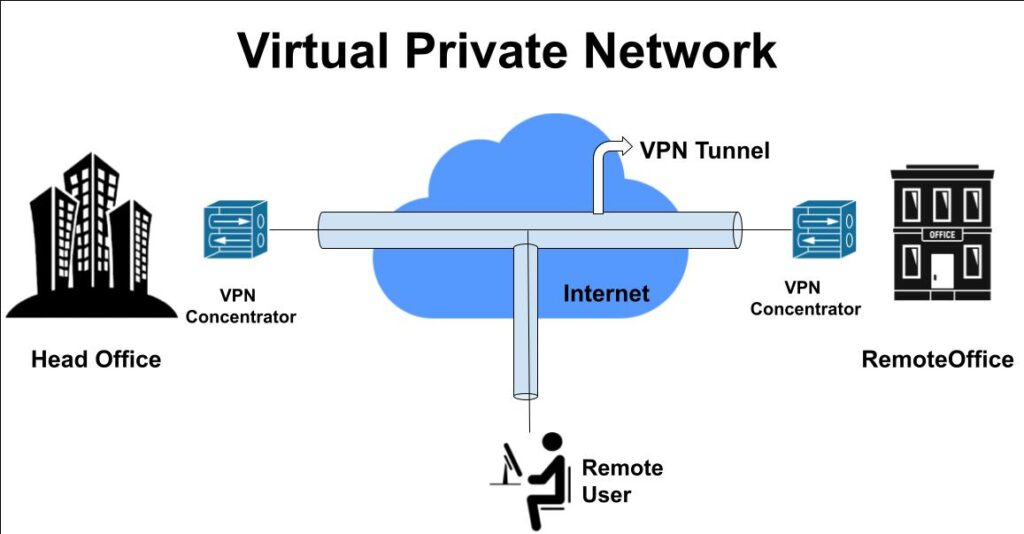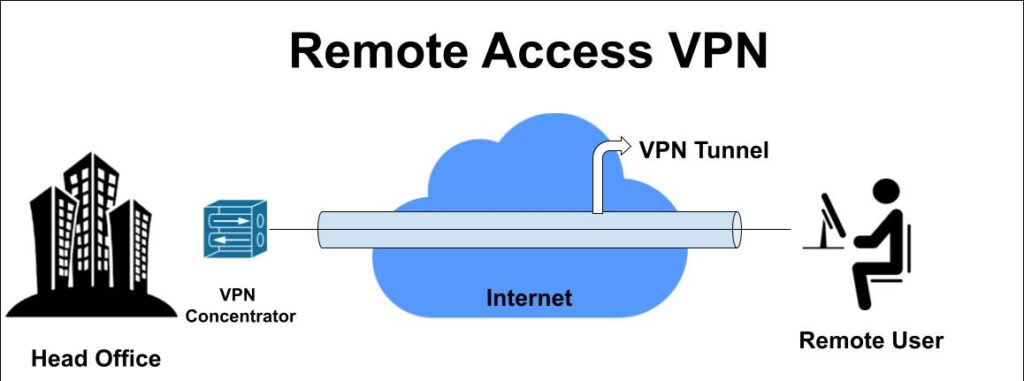
What is Virtual Private Network (VPN)?
Virtual Private Network (VPN) create a private network tunnel when you are using public network. VPN hides your IP address and location, provide a secure communication. VPNs encrypt your internet traffic and disguise your online identity. This makes it more difficult for third parties to track your activities online and steal data. The encryption takes place in real time. VPN prevents unauthorized people from eavesdropping on the traffic and allows the users to conduct work remotely. VPN technology is widely used in corporate environments for a secure communication channel.
How Does VPN Work ?
Basically VPN hides your IP address and location, by letting the network redirect it via a remote server configured by a VPN host. Means that if you browse anything on internet with a VPN, VPN remote server becomes the source of your data. This means third parties and even your internet service provider (ISP) cannot see which websites you surf or what data you download, upload, send and receive online. With the help of VPN servers, you can spoofed everyone by changing server to other countries and hide your location.
Types of VPN
1. Site to Site VPN

A Site-to-Site VPN is also known as Router-to-Router or LAN-to-LAN VPN. A site to site VPN is essentially a private network developed to hide private intranets and allow users of these secure networks to access each other’s resources & communication. Site to site VPN is basically used by large corporates. Organizations and corporates with various branch offices in different geographical locations, use Site-to-site VPN to connect the network of one office branch location to the network of another office branch location. Site-to-site VPN create a imaginary tunnel between the networks at geographically distant offices and connect them through the Internet with a secure and private communication channel.
2. Remote Access VPN

Remote access VPN is also known as client-to-site VPN. Remote Access VPN allows a remote user who is working from their home to connect to a corporate’s private network and access all its services and resources remotely. Employees can dial into the company network from their home office via the secure connection and act as if they were sitting in the office. The connection between the remote user and the private network is secure, private and encrypted. This is the most increasingly form of VPN, It prevents third parties from accessing and compromising the network connection.
Benefits of Using VPN
- Keep You Safe: VPN secure your communication while surfing on internet. And protect you from online threats like scams, frauds and hackers.
- Protect Your Data: VPN secure your communication by creating an imaginary tunnel, and when your data moves through this tunnel it encrypt your data and keeps your data private from third parties.
- Access Blocked Content: With the help of VPN you can hide your IP address and change your location from one country to another country, and access blocked websites and services which is censored in your country.
- Save Your Money: By using VPN you save your money. Many e-commerce websites like amazon & Ali-express display different prices to different countries. Suppose an Iphone price is 1000$ in your country but 800$ in Dubai, Just change your location by using VPN and purchased it.
- Affordable Security: You can buy a VPN service only few dollars. And unblock any website you want and keep your connection anonymous and secure. VPNs are significantly cheaper than other types of security plans. Instead of hiring security analyst, you can use VPN for your network security.


VPN – what a rip off!!!
Hi Richard. Love this article. Would this process also work with the linksys velop mesh router?